Michio Kaku
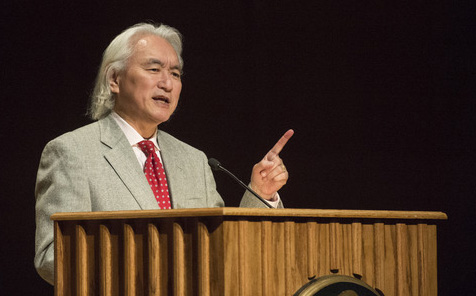 "What is the most complex object in the known universe?," asked futurist, physicist and bestselling author Michio Kaku at DePauw University tonight. "Believe it or not, it sits on your shoulder." Kaku, author of the book The Future of the Mind, which recently topped the New York Times list of bestsellers, discussed how science is rapidly learning more about how the brain works and the ways in which that will impact our lives in the years to come.
"What is the most complex object in the known universe?," asked futurist, physicist and bestselling author Michio Kaku at DePauw University tonight. "Believe it or not, it sits on your shoulder." Kaku, author of the book The Future of the Mind, which recently topped the New York Times list of bestsellers, discussed how science is rapidly learning more about how the brain works and the ways in which that will impact our lives in the years to come.
In a Timothy and Sharon Ubben Lecture in Kresge Auditorium, Dr. Kaku gave his audience a glimpse into what the future may hold in a speech that included a healthy dose of anecdotes and humor.
Kaku, one of the most widely recognized figures of science in the world today, is the co-founder of string field theory (a branch of string theory) and continues Albert Einstein's search to unite the four fundamental forces of nature into one unified theory. He holds the Henry Semat Chair in Theoretical Physics at the City University of New York, has written several bestselling books, is the science correspondent for CBS This Morning and hosts the radio programs Science Fantastic and Explorations in Science. He has been called "a superhero of the incomprehensible" by Cosmos magazine.
Telekinesis -- the power to move objects with the mind -- can be done in laboratories today, the professor noted. Using headbands, video game players and computer users can control the devices with their thoughts and no keystrokes or mouse movements. Kaku says that someday soon, the notion of typing on a keyboard will seem as old fashioned as the horse and buggy.
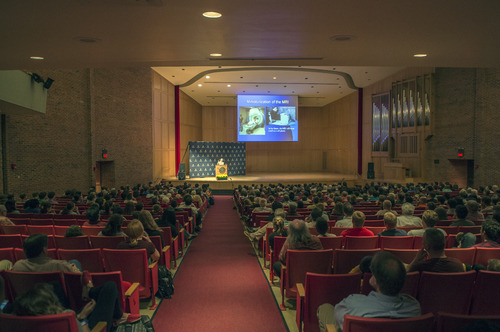 "Silicon Valley envisions a day when you walk into a room and you mentally turn on the lights, mentally turn on a TV set, mentally scan the Internet, and when you send an email you simply think, rather than physically typing," the acclaimed physicist noted.
"Silicon Valley envisions a day when you walk into a room and you mentally turn on the lights, mentally turn on a TV set, mentally scan the Internet, and when you send an email you simply think, rather than physically typing," the acclaimed physicist noted.
Scientists today are also able to connect high-tech artificial limbs known as exoskeletons directly to a patient's brain, so that when a person's mind sends the impulse to move the artificial limb, it happens just as it would if the appendage were real.
"We can do this now," Dr. Kaku told the audience of about 850 students, faculty and staff, alumni and members of the Greencastle community. "We can connect a human mind to a robot and make the robot move. That could be the future of the space program. Space is dangerous ... Why not mentally control robots?"
He added that in the future, "We could have astronauts on the moon who are actually robots. The real astronaut is sitting in his hot tub in his living room controlling the robot by remote control."
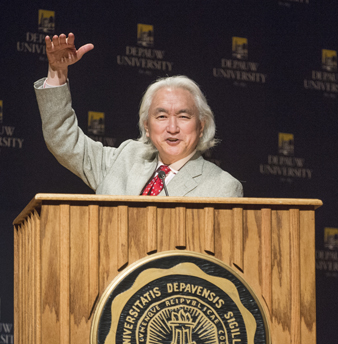 Science is also now capable of uploading memories into the brains of mice, which Kaku believes will have major implications for human health. "The short term goal is to create a brain pacemaker for Alzheimer's patients," he stated. "One day in America we're gonna have millions of Alzheimer's patients wandering the streets causing havoc, not knowing where they live." With the brain pacemaker the physicist foresees, "You push a button and instantly you know where you live. This could solve an urgent problem."
Science is also now capable of uploading memories into the brains of mice, which Kaku believes will have major implications for human health. "The short term goal is to create a brain pacemaker for Alzheimer's patients," he stated. "One day in America we're gonna have millions of Alzheimer's patients wandering the streets causing havoc, not knowing where they live." With the brain pacemaker the physicist foresees, "You push a button and instantly you know where you live. This could solve an urgent problem."
With a grin, the professor added, "Who knows, in the coming decades we may be able to pass college courses that we flunked when we were here at DePauw University. Wouldn't it be great to push a button and learn calculus? Or maybe a worker gets laid off because he doesn't have new skills. You'll be able to upload these things, and maybe one day you will upload the memory of the vacation that you never had."
Kaku also sees a future where dreams can be photographed and recorded and people use special contact lenses to access the Internet by blinking.
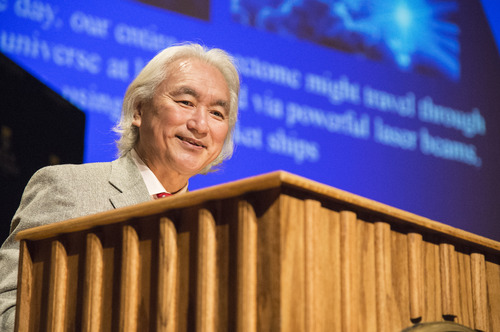 Last year's announcement by the Obama administration launching the BRAIN Initiative (Brain Research through Advancing Innovative Neurotechnologies) is a sign that what was once science fiction will become real science, Kaku says. The collaborative research initiative has the goal of mapping the activity of every neuron in the human brain.
Last year's announcement by the Obama administration launching the BRAIN Initiative (Brain Research through Advancing Innovative Neurotechnologies) is a sign that what was once science fiction will become real science, Kaku says. The collaborative research initiative has the goal of mapping the activity of every neuron in the human brain.
"In the future you will have two discs. One disc is the genome. You can have the genome created today. It costs $1,000 to read every gene of your body," Kaku pointed out. "But in the future you will have a second disc, and that is the connectome, containing all the circuitry of the human mind."
The information gleaned from the project could provide breakthroughs in treating mental illness. But there are other implications, the futurist added. In the latest Superman movie, Man of Steel, the superhero's dead father appears as a hologram, Kaku recalled.
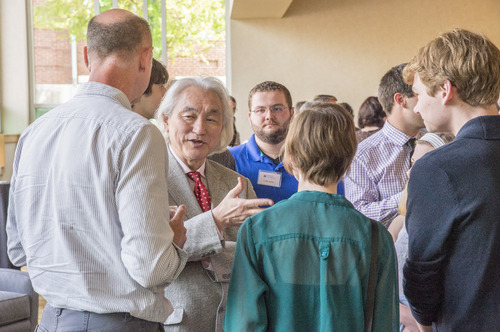 "If your genome and your connectome live on, in some sense part of you is immortal, part of you lives forever -- your genes and your mind," Kaku offered. "In the future we might have a 'library of souls' -- that is, the complete connectome of somebody, including their memories, feelings, whatever, personality, on a disc, and you'd talk to them. One day, you may be able to talk to your ancestors; in other words, your descendants may one day go to the library and have a conversation with you centuries from now. I wouldn't mind talking to Einstein. I'm sure politicians wouldn't mind talking to Winston Churchill." (at left: Kaku chats with students and faculty at the dinner which preceded the Ubben Lecture)
"If your genome and your connectome live on, in some sense part of you is immortal, part of you lives forever -- your genes and your mind," Kaku offered. "In the future we might have a 'library of souls' -- that is, the complete connectome of somebody, including their memories, feelings, whatever, personality, on a disc, and you'd talk to them. One day, you may be able to talk to your ancestors; in other words, your descendants may one day go to the library and have a conversation with you centuries from now. I wouldn't mind talking to Einstein. I'm sure politicians wouldn't mind talking to Winston Churchill." (at left: Kaku chats with students and faculty at the dinner which preceded the Ubben Lecture)
Dr. Kaku says such a thing might be possible "late in this century."
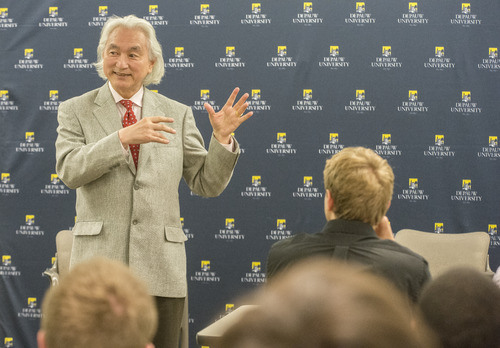 The connectome separates mind from body and would be much more than a tape recording. "I mean something that will actually interact with you; you can ask a question," Kaku elaborated. "Your personality traits, maybe there are 100 of them, you can numerically put this on a chart ... and you could then put that into a avatar that then acts like you. It is not you, of course, but it acts like you ... you can create a computer program that will do this. It's the basis of the movie Her." (at right: Dr. Kaku talks with students at an afternoon forum)
The connectome separates mind from body and would be much more than a tape recording. "I mean something that will actually interact with you; you can ask a question," Kaku elaborated. "Your personality traits, maybe there are 100 of them, you can numerically put this on a chart ... and you could then put that into a avatar that then acts like you. It is not you, of course, but it acts like you ... you can create a computer program that will do this. It's the basis of the movie Her." (at right: Dr. Kaku talks with students at an afternoon forum)
Before too long, the futurist believes each of us will carry personal magnetic resonance imaging machines. "One day, in your cell phone, you will have more computer power than a modern university hospital. You'll be able to take MRI scans of your body by simply waving your cell phone over your body."
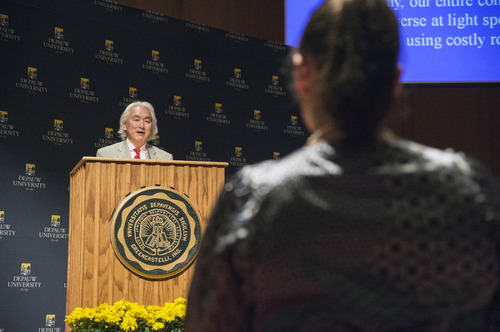 During the question-and-answer session that followed his speech, Professor Kaku was asked about the ethics of his topic: just because things such as uploading memories are possible, does that mean they must be pursued? "Realize that science is like a hammer, it's a sword, it's neutral," he replied. "It's a sword that can cut against ignorance, poverty (and) disease, or it can cut against people, and it has the be controlled. People have to decide democratically how far to push this technology."
During the question-and-answer session that followed his speech, Professor Kaku was asked about the ethics of his topic: just because things such as uploading memories are possible, does that mean they must be pursued? "Realize that science is like a hammer, it's a sword, it's neutral," he replied. "It's a sword that can cut against ignorance, poverty (and) disease, or it can cut against people, and it has the be controlled. People have to decide democratically how far to push this technology."
Dr. Kaku's previous books include two additional New York Times bestsellers, Physics of the Future and Physics of the Impossible, as well as Hyperspace and Visions: How Science Will Revolutionize the 21st Century.
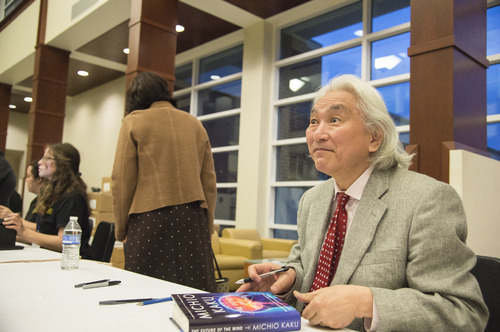 His day at DePauw began with a session with a selected group of science and physics students at the Julian Center for Science and Mathematics, where he said "Science is the engine of prosperity" and must be better supported at all levels. That was followed by a meeting with student media, then a dinner and reception at the Inn at DePauw, which was attended by students, faculty, staff and alumni.
His day at DePauw began with a session with a selected group of science and physics students at the Julian Center for Science and Mathematics, where he said "Science is the engine of prosperity" and must be better supported at all levels. That was followed by a meeting with student media, then a dinner and reception at the Inn at DePauw, which was attended by students, faculty, staff and alumni.
A long line formed in the Great Hall of the Green Center for the Performing Arts following Professor Kaku's speech, as he signed books for those who attended the DePauw event.